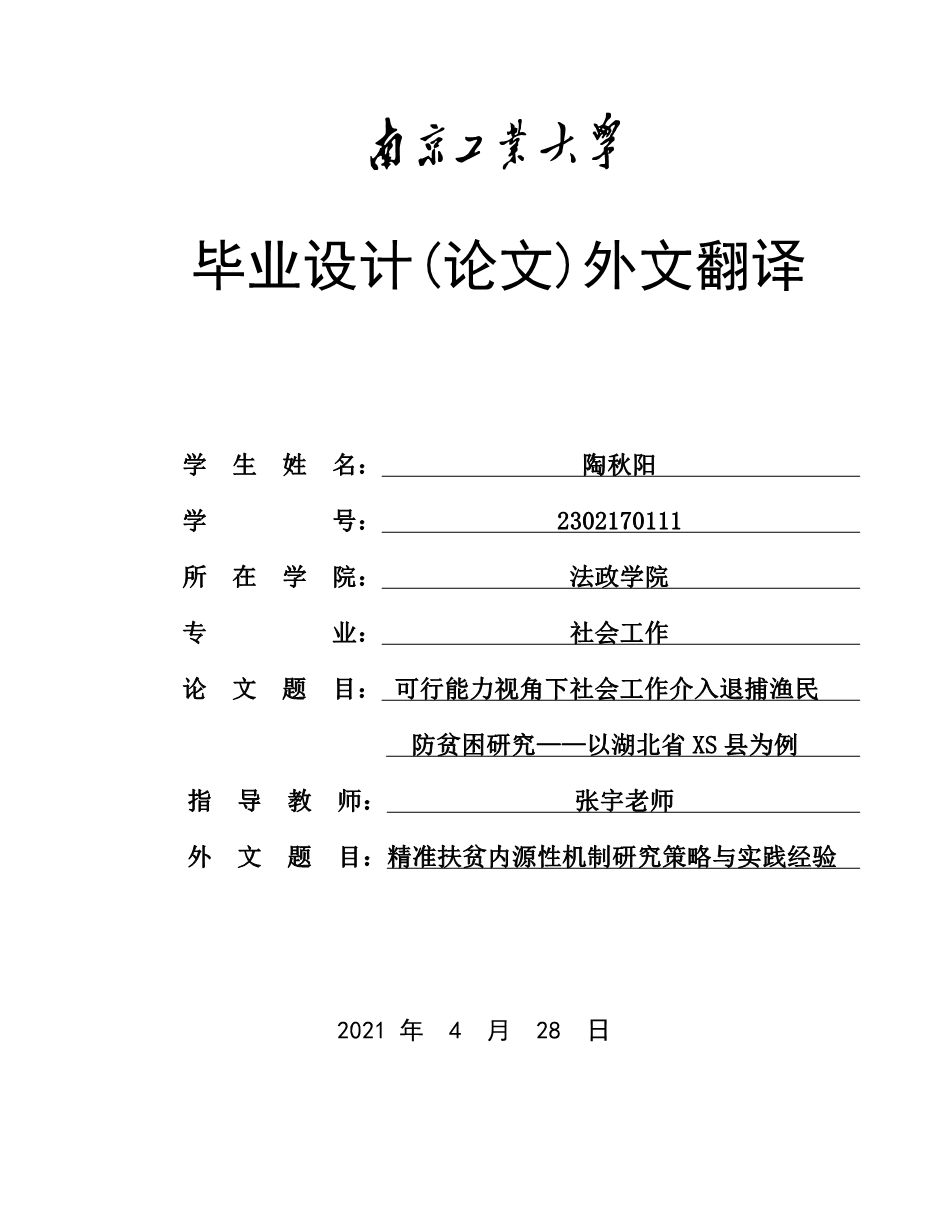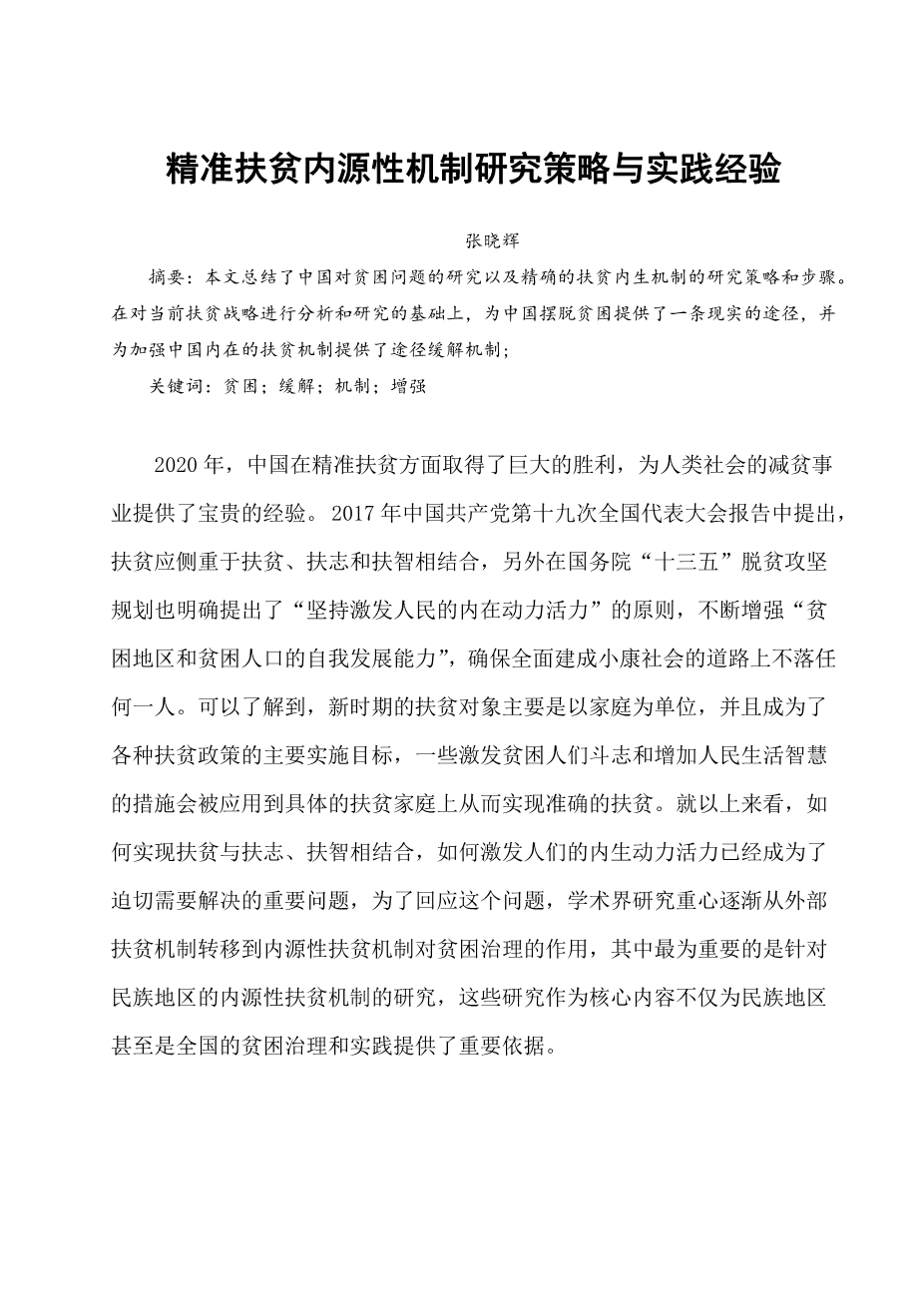精准扶贫内源性机制的研究策略和实践经验
英文原文
Research Strategy and Practical Experience of
Endogenous Mechanism of Precision Poverty Alleviation
Xiaohui Zhang
ABSTRACT: This article summarizes Chinesersquo;s researches on poverty problem as well as research strategies and steps of accurate poverty alleviation endogenous mechanism. Based on the analyze and research on the current poverty alleviation strategies, it proposes a practical path for China to get rid of poverty as well as ways to strengthen Chinese endogenous mechanism for poverty alleviation.
Keywords: Poverty; Alleviation; Mechanism; Strengthen .
In 2020, China has made great progress in poverty alleviation with precision, which provides valuable experience for poverty management in human society. In the report of the 19th National Congress of the Communist Party of China in 2017, it was put forward that poverty alleviation should focus on the combination of poverty alleviation, supporting ambition and intelligence. The 13th Five-Year Plan for Poverty Alleviation of the State Council also put forward the principle of 'persisting in stimulating peoples endogenous motivation and vitality', constantly enhancing 'self-development ability of poor areas and poor people', and ensuring that they enter a comprehensive well-off society simultaneously with the whole country. It can be seen that the poor households, the main target of poverty alleviation in the new period, have been targeted by poverty alleviation policies, and will be stimulated by the measures to help peoples aspirations and intelligence, so as to achieve accurate poverty alleviation.
Therefore, how to realize the combination of poverty alleviation with supporting ambition and intelligence, and how to stimulate peoples endogenous dynamic vitality has become an important problem that needs to be solved urgently. To solve this problem, the research on poverty governance from the external mechanism of poverty alleviation has gradually declined, while the importance of the research on endogenous poverty alleviation mechanism has gradually become prominent, especially in ethnic areas, which takes the endogenous mechanism of precise poverty alleviation in ethnic areas as the core content to provide a basis for poverty governance research and practice in ethnic areas and even the whole country.
1. A summary of poverty research
Since 1990s, a group of development economists, represented by Amartya Sen, put forward the development theory around ability, freedom, rights and welfare, and constructed a new poverty view based on feasible ability. From the perspective of feasible ability, we can see that poverty is not only lack of food and clothing or unsatisfied basic needs, but more importantly, people cant practice their possible lifestyle, that is, lack of ability. The feasibility poverty perspective can make up for the limitations of income poverty perspective research, thus leading the research on external poverty alleviation mechanism to extend to sustainable and proactive endogenous poverty alleviation research, which is conducive to the expansion and deepening of accurate poverty alleviation theory. Different from the existing accurate poverty alleviation researches, which focus on external policy mechanisms such as poverty identification and targeting mechanism and governance subject participation mechanism, the study of endogenous poverty alleviation mechanism from the perspective of poverty-stricken areas and poor peoples own capacity building is a supplement and extension of exogenous poverty alleviation mechanism, rather than a negation, which has important theoretical and practical significance for Chinas poverty governance research.
As the main body, the poor are objectified, and their subjectivity and ability are neglected, resulting in the poors 'poor psychology', and pinning their hopes on the' poverty alleviation actions' of the government and society. In the 1990 World Development Report, poverty was defined as the lack of ability to reach the minimum standard of living. Edward C. Banfield, a professor at Harvard University, thinks that poverty is a kind of culture, and individuals who are caught by poverty culture cannot make plans for their future, because they live in a poverty culture that has lasted for generations, and they cannot make plans for the future psychologically. The United Nations Development Programme pointed out in Human Development Report(1996)that poverty is not only a lack of income, but also a lack of basic survival and development ability. Amartya Sen, winner of the Nobel Prize in Economics in 1998,thinks that poverty should be defined conceptually as lack of ability rather than low income, which means deprivation of peoples feasible ability. This indicates that the definition of poverty in western academic circles has changed from a single income dimension to multidimensional poverty, and the understanding of poverty has changed from insufficient income to insufficient ability. In the anti-poverty cause, 'ability poverty' is the focus of attention, and in the process of promoting the development of poverty-stricken areas, 'people-oriented' is increasingly emphasized, paying more attention to changing the development ability of the poor themselves. The research on the connotation of poverty in Chinese academic circles includes income pover
剩余内容已隐藏,支付完成后下载完整资料
英语译文共 9 页,剩余内容已隐藏,支付完成后下载完整资料
资料编号:[267194],资料为PDF文档或Word文档,PDF文档可免费转换为Word
以上是毕业论文外文翻译,课题毕业论文、任务书、文献综述、开题报告、程序设计、图纸设计等资料可联系客服协助查找。




